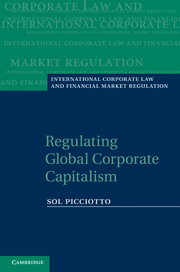Book contents
- Frontmatter
- Contents
- Preface
- Acknowledgements
- Table of cases
- Abbreviations and acronyms
- 1 Transformations of global governance
- 2 Liberal internationalism: strengths and limits
- 3 From interdependence to fragmentation
- 4 Corporations and competition
- 5 Corporate rights and responsibilities
- 6 International taxation
- 7 Regulation of international finance
- 8 The WTO as a node of global governance
- 9 Intellectual property rights
- 10 Law and legitimacy in networked governance
- Bibliography
- Index
6 - International taxation
Published online by Cambridge University Press: 05 June 2012
- Frontmatter
- Contents
- Preface
- Acknowledgements
- Table of cases
- Abbreviations and acronyms
- 1 Transformations of global governance
- 2 Liberal internationalism: strengths and limits
- 3 From interdependence to fragmentation
- 4 Corporations and competition
- 5 Corporate rights and responsibilities
- 6 International taxation
- 7 Regulation of international finance
- 8 The WTO as a node of global governance
- 9 Intellectual property rights
- 10 Law and legitimacy in networked governance
- Bibliography
- Index
Summary
Taxation and governance
Taxation is key to the character and functioning of the state, economy and society. As Schumpeter put it ‘Taxes not only helped to create the state. They helped to form it’ (1918: 108). Clearly, the ability to extract revenue is central to state power, and the way this is done has changed as the state itself has transformed. Fiscal sociologists and historians have analysed the development of ‘tax states’ according to various schematic stages: from the tribute state, and the domain state, in which taxes were extracted from subjects for the benefit of the ruler; to the tax state, in which they gradually became legitimized as contributions to the costs of activities accepted as necessary and beneficial for society as a whole; and finally the modern fiscal state, in which taxation is integrated into a system of public finance and macroeconomic management (Bonney 1999; Ormrod et al. 1999; Daunton 2001, 2002).
Although it always involves some degree of coercion, taxation is more effective to the extent that it is consensual, and certainly its effectiveness has increased as governments have become more successful at persuading citizens of the fairness of taxation and the benefits of collective spending. Historically the emergence of modern ‘fiscal states’ has depended on two main factors. First has been the legitimacy of taxation, resting on the acceptance of both justice in its extraction and control over its expenditure.
- Type
- Chapter
- Information
- Regulating Global Corporate Capitalism , pp. 207 - 257Publisher: Cambridge University PressPrint publication year: 2011



